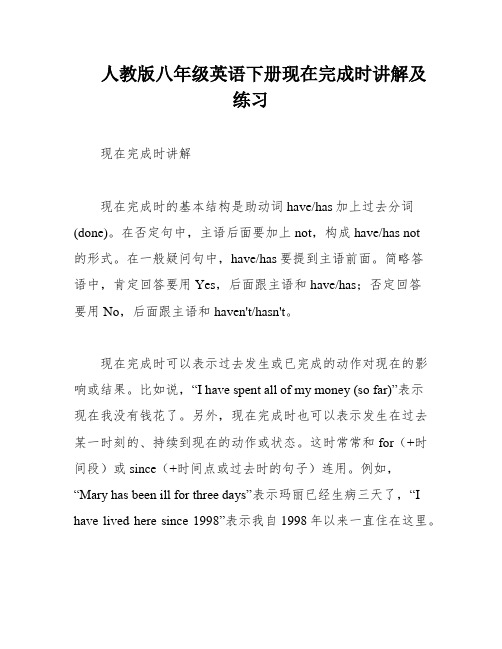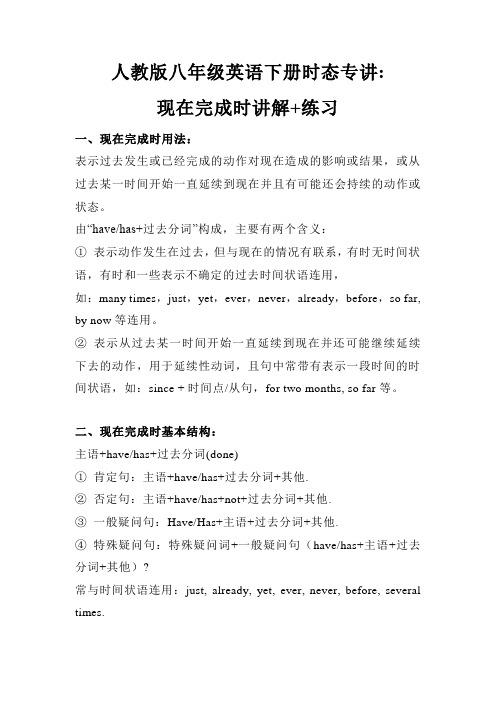八年级英语下册现在完成时与其它时态的辨析(易错考点回顾+提分闯关训练)练习人教新目标版
人教版八年级英语下册现在完成时讲解及练习

人教版八年级英语下册现在完成时讲解及练习现在完成时讲解现在完成时的基本结构是助动词have/has加上过去分词(done)。
在否定句中,主语后面要加上not,构成have/has not的形式。
在一般疑问句中,have/has要提到主语前面。
简略答语中,肯定回答要用Yes,后面跟主语和have/has;否定回答要用No,后面跟主语和haven't/hasn't。
现在完成时可以表示过去发生或已完成的动作对现在的影响或结果。
比如说,“I have spent all of my money (so far)”表示现在我没有钱花了。
另外,现在完成时也可以表示发生在过去某一时刻的、持续到现在的动作或状态。
这时常常和for(+时间段)或since(+时间点或过去时的句子)连用。
例如,“Mary has been ill for three days”表示玛丽已经生病三天了,“I have lived here since 1998”表示我自1998年以来一直住在这里。
现在完成时还有一些标志词,可以表达过去完成的动作对现在的影响。
这些标志词包括already、just和yet。
例如,“He has al ready got her help”表示他已经得到她的帮助,“He hasn't come back yet”表示他还没有回来。
This is the best film I have ever seen。
I have never seen a better movie before.He has never been to Beijing before。
He has never had the chance to visit Beijing.He says he has been to the USA three times already。
He has had the opportunity to visit the USA on three separate ns.So far。
八年级英语下册现在完成时及现在完成进行时讲解及练习人教新目标

八年级英语下册现在完成时及现在完成进行时讲解及练习人教新目标八年级英语下册现在完成时及现在完成进行时讲解及练习人教新目标一.现在完成时的构成:现在完成时由助动词have(has)+动词的过去分词构成。
has用于第三人称单数,have用于其他各种人称.二.现在完成时的用法:其用法主要有三种I.“已完成”用法:表示一个过去发生并结束的动作对现在造成的影响或结果。
这一类情况可以细致分为下述两种情况。
1)表示开始于过去的动作刚刚结束。
常和just,now,already,yet,not…yet等不确定的时间状语连用。
Li Ming has just turned off the light. 李明刚刚把灯关上。
(说明现在灯关上了)I've finished my homework now. 现在我已经做完作业了。
(说明可以交作业或做别的了)2)表示过去动作的结果,现在仍残留着。
一般不用时间状语。
I have lost my pen. 我把笔丢了。
(说明过去某时丢的,现在我还没找到这支笔)She has become a teacher. 她已经当了老师。
(说明她现在仍是老师)II.“未完成”用法。
表示动作或状态从过去某时开始,持续到现在,可能继续下去,也可能刚刚结束。
常和表示一段时间的状语连用。
如today,this week(month),lately,recently,these days,in the past few days,during the last two weeks,since,since yesterday,since 2 days ago,since 1991,for a long time,for a month,so far,up to now,till(until) now等。
He has lived here for 30 years. 他住在这儿三十年了。
(现在还住在这儿)They've known each other since childhood. 他们从小彼此相识。
时态复习(现在完成时与各时态辨析)牛津译林版英语八年级下册

八年级时态复习——现在完成时与时态辨析Step11.I have been living here _____ 1999.A. forB. afterC. inD. since2._____ have you been playing the guitar? For 5 years.A. How soonB. How longC. How farD. How often3.______ may I keep these books? For two weeks.A. How oftenB. How farC. How longD. How soon4.______ have you been here? I’ve been here for months.A. How longB. How oftenC. How muchD. How many5. The boy ______TV all morning.A. has watchedB. had watchedC. has been watchingD. watched6. How long _____ you _____ stamps? Since two years ago.A. have, collectedB. did, collectC. have , been collectingD. are, collecting7.They are still working in the fields. They ______ for two hours.A. was workingB. has been workingC. workedD. are working8.He looks tired. Oh , he ____ for three hours.A. have been skatingB. have been skatedC. has been skatingD. has been skated9. He ______ it for two hours, and he is still watching now.A. has beenB. watchingC. has been watchingD. is watching10. The famous writer _____ one new book in the past two years.A. is writingB. was writingC. wroteD. has writtenStep2现在完成时态讲练2一、英语中还有一些动词的意义决定它们所表示的动作不能延续,只是一瞬间就结束的动作,这类动词叫做“非延续性动词”,常见的有:e,go,arrive,reach,see,hear,close,open,leave,begin,start,lose,buy,fall,join,die,get up,bee,borrow,lend,find,finish,receive等。
八年级下册时态知识点

八年级下册时态知识点时态是英语语法中非常重要的部分,正确使用时态和合适运用时态可以确保我们的英语表达准确、流利、自然。
本文将对八年级下册学生需要掌握的时态知识点做出一些简单的解释和应用,以帮助学生更好地理解和运用时态。
一、一般现在时 (Present Simple Tense)一般现在时用于表示经常性或习惯性的动作或状态。
例如:“I go to school every day.”(我每天去上学。
)、“She plays basketball every Saturday.”(她每个星期六打篮球。
)、“The sun rises in the east.”(太阳从东方升起。
)等等。
此外,一般现在时还可用于表示真理、规律和普遍性的事实。
例如:“Water freezes at zero degrees centigrade.”(水在零摄氏度时结冰。
)、“The earth revolves around the sun.”(地球绕太阳旋转。
)、“A bird can fly.”(鸟能飞。
)等等。
二、一般过去时 (Past Simple Tense)一般过去时用于表示已经完成的过去的动作或状态。
例如:“I visited my grandparents last weekend.”(我上周末去看了我的祖父母。
)、“She studied psychology in university.”(她在大学学了心理学。
)、“He worked as a waiter in a restaurant before.”(他以前在一个餐馆当过服务员。
)等等。
另外,一般过去时也可以用于表示过去习惯性或重复性的动作,但这种用法通常会和表示具体时间的副词或短语搭配使用。
例如:“I used to eat a lot of junk food when I was a kid.”(我小时候经常吃垃圾食品。
)、“He would always listen to music on his way to work.”(他上班的路上总是听音乐。
【名师推荐资料】八年级英语下册 现在完成时与其它时态的辨析(易错考点回顾+提分闯关训练)练习 人教新目

【易错考点回顾】现在完成时与其它时态的辨析【易错点睛】在现在完成时的考查中,以现在完成时与一般过去时的辨析较为常见。
两者有如下区别。
1. 两者都表示在过去发生的动作。
但现在完成时侧重过去的动作对现在造成的影响。
而一般过去时侧重于表过去的动作,与现在无关。
如:Yesterday I went to the zoo. 昨天我去了动物园。
(仅说明昨天去了动物园,与现在无关)Li Lei has read the book. 李磊已看过那本书。
(说明李磊了解那本书的内容)2. 连用的时间状语不同:与现在完成时连用的时间状语有already, yet, still, just, so far, in the last/past…, before, ever, never, since或for引出的时间等。
而一般过去时则常与ago, yesterday, last…, in 2000, just now等连用。
Have you ever picked flowers or steeped on the grass in a park? 你们曾在公园里摘过花或踩过草地吗?Father bought that watch ten years ago. 爸爸十年前买了那块手表。
I have never seen the film before. 我以前从没看过这部影片。
一招致胜【易错考点回顾】1. —______ you ______ your homework yet?—Yes. I ______ it a moment ago.A. Did; do; finishedB. Have; done; finishedC. Have; done; have finishedD. Will; do; finish【错因分析】题干中有个yet,这是现在完成时常用的副词,如果考生忽视了这一点,就容易错选,而答语中有个 a moment ago,这是一般过去时的常用时间状语,所以在做时态题的时候,需把握住题干中的时间状语,否则容易错选。
现在完成时与一般过去时辨析 初中八年级下册英语教案教学设计课后反思

课题:一般现在时与现在完成时辨析学段:初中学科:英语授课人:雷艳教学目标语言知识:使学生学习并掌握现在完成时与一般过去时的语法知识,完成知识的巩固和练习。
语言技能:让学生学会现在完成时和过去时从而完成知识的巩固和练习。
过程与方法:通过微课讲解语法知识点,结合例句练习巩固学习成果。
情感态度:激发学生对知识的归纳总结运用的学习能力。
教学重难点重点:理解现在完成时与过去时的定义与区别。
难点: 正确判断现在完成时与过去时,并完成相关练习教学准备教师准备:多媒体课件。
学生准备:笔记本记笔记。
教学步骤Step1 Lead inGreeting and show titleStep1 Presentation一、一般过去时与现在完成时的定义区别1、一般过去时表示在过去某个时间发生的动作或者存在的状态,也表示过去经常反复发生的动作强调动作发生在过去某一时间。
与现在不发生联系,是过去的动作。
2.现在完成时表示过去发生的某一动作对现在造成的影响或结果,或者从过去发生一直持续到现在(包括现在)的某个动作或者状态。
主要强调的是对现在的影响或者动作、状态持续到现在.例句:We didn’t see him last year.我们去年没有见过他。
(强调去年没见过,现在不一定见没见。
)We haven’t seen him.我们没有见过他。
(现在仍然未见)He lived here last night.他昨天晚上住在这儿(只是昨晚住)He has lived here since he was born .自他出生以来一直住在这儿(居住这个动作延续到现在)二.时间状语的区别一般过去时yesterday /last week/…ago/ in1980/ in October/ just now例句:I went to London last month.I was born in 1984.现在完成时1、 so far/ ever/ never/ just/ yet/till/until/ up to now/ in past years/always等2、 since+时间点或for+时间段例句:They haven't finished their homework yet.I have never been to the Great Wall.He has been a soldier for three years.I have lived here since my childhood.共同的时间状语:this morning, tonight, this April, now, once,before, recently,lately 等例如:I ate an hamburger this morning.I have eaten an hamburger this morning.三、需要注意的问题1、动词的延续性现在完成时当表示持续到现在的动作或状态,动词一般是延续性的,如live, teach, learn, work, study, know等. 而如果仅仅用现在完成时表示过去动作对现在的影响或者用一般过去时则可用非延续性动词。
八年级下册英语时态归纳

八年级下册英语时态归纳八年级下册英语时态归纳过去时态:1. 一般过去时:表示过去某个时间发生的动作或存在的状态。
例如:I saw her at the park yesterday.(我昨天在公园见到她。
)2. 过去进行时:表示过去某个时间正在进行的动作。
例如:We were playing soccer when it started raining.(当开始下雨时,我们正在踢足球。
)3. 过去完成时:表示过去某个时间已经完成的动作或状态。
例如:She had already finished her homework when her friend called.(当她朋友打电话来时,她已经完成作业了。
)现在时态:1. 一般现在时:表示经常性、习惯性的动作或现在的状态。
例如:He often goes swimming on weekends.(他经常在周末去游泳。
)2. 现在进行时:表示说话时正在进行的动作。
例如:She is studying English at the moment.(她此刻正在学习英语。
)3. 现在完成时:表示过去某个时间开始并一直持续到现在的动作或状态。
例如:I have known her since we were children.(我从我们还是孩子的时候就认识她了。
)将来时态:1. 一般将来时:表示将来某个时间要发生的动作或存在的状态。
例如:I will visit my grandparents next week.(我下周要去看望我的祖父母。
)2. 将来进行时:表示将来某个时间正在进行的动作。
例如:Tomorrow at this time, they will be flying to Paris.(明天这个时候,他们将在飞往巴黎的途中。
)3. 将来完成时:表示将来某个时间之前已经完成的动作或状态。
例如:By the end of this year, he will have graduated from university.(到今年年底,他就会从大学毕业了。
人教版八年级英语下册时态专讲-现在完成时讲解+练习

人教版八年级英语下册时态专讲:现在完成时讲解+练习一、现在完成时用法:表示过去发生或已经完成的动作对现在造成的影响或结果,或从过去某一时间开始一直延续到现在并且有可能还会持续的动作或状态。
由“have/has+过去分词”构成,主要有两个含义:①表示动作发生在过去,但与现在的情况有联系,有时无时间状语,有时和一些表示不确定的过去时间状语连用,如:many times,just,yet,ever,never,already,before,so far, by now等连用。
②表示从过去某一时间开始一直延续到现在并还可能继续延续下去的动作,用于延续性动词,且句中常带有表示一段时间的时间状语,如:since + 时间点/从句,for two months, so far等。
二、现在完成时基本结构:主语+have/has+过去分词(done)①肯定句:主语+have/has+过去分词+其他.②否定句:主语+have/has+not+过去分词+其他.③一般疑问句:Have/Has+主语+过去分词+其他.④特殊疑问句:特殊疑问词+一般疑问句(have/has+主语+过去分词+其他)?常与时间状语连用:just, already, yet, ever, never, before, several times.Already: “已经”; yet“仍然, 还”,这两个副词常常用于完成时态, 其中already常用于肯定句, yet常用于否定句和疑问句中。
如: Jim has already finished his work. Jim已经把他的工作做完了。
Mother hasn’t come home yet. 妈妈还没回来。
三、现在完成时一般过去时的区别:现在完成时表示的是与现在有关联的过去事件;而一般过去时则与现在毫无关系,只是单纯的过去的情况。
比较:I have lost my pen, so I have to buy one.我丢了钢笔,所以得去买一枝。
- 1、下载文档前请自行甄别文档内容的完整性,平台不提供额外的编辑、内容补充、找答案等附加服务。
- 2、"仅部分预览"的文档,不可在线预览部分如存在完整性等问题,可反馈申请退款(可完整预览的文档不适用该条件!)。
- 3、如文档侵犯您的权益,请联系客服反馈,我们会尽快为您处理(人工客服工作时间:9:00-18:30)。
【易错考点回顾】现在完成时与其它时态的辨析【易错点睛】在现在完成时的考查中,以现在完成时与一般过去时的辨析较为常见。
两者有如下区别。
1. 两者都表示在过去发生的动作。
但现在完成时侧重过去的动作对现在造成的影响。
而一般过去时侧重于表过去的动作,与现在无关。
如:Yesterday I went to the zoo. 昨天我去了动物园。
(仅说明昨天去了动物园,与现在无关)Li Lei has read the book. 李磊已看过那本书。
(说明李磊了解那本书的内容)2. 连用的时间状语不同:与现在完成时连用的时间状语有already, yet, still, just, so far, in the last/past…, before, ever, never, since或for引出的时间等。
而一般过去时则常与ago, yesterday, last…, in 2000, just now等连用。
Have you ever picked flowers or steeped on the grass in a park? 你们曾在公园里摘过花或踩过草地吗?Father bought that watch ten years ago. 爸爸十年前买了那块手表。
I have never seen the film before. 我以前从没看过这部影片。
一招致胜【易错考点回顾】1. —______ you ______ your homework yet?—Yes. I ______ it a moment ago.A. Did; do; finishedB. Have; done; finishedC. Have; done; have finishedD. Will; do; finish【错因分析】题干中有个yet,这是现在完成时常用的副词,如果考生忽视了这一点,就容易错选,而答语中有个 a moment ago,这是一般过去时的常用时间状语,所以在做时态题的时候,需把握住题干中的时间状语,否则容易错选。
【思路点拨】把握住现在完成时的使用特点,抓住题干中的关键词和时间状语即可快速的判断出正确答案。
【正确答案】正确答案为B。
句意:——你做完作业了吗?——是的。
我刚才做完的。
根据问句中的yet可知应该用现在完成时态,根据答语中时间状语a moment ago可知应该用一般过去时。
故选B。
【中考链接】1. (2017北京中考)Lily is my classmate. We _____ each other since she came to our school.A. knowB. knewC. have knownD. will know【答案】C解析:考查动词的时态。
since引导时间状语从句时,从句用一般过去时,主句应用现在完成时。
故选C。
2. (2018青岛)—It’s time to work now.—OK, I’ll wake Carl up. He ______ for an hour.A. has fallen asleepB. has been asleepC. fell asleepD. falls asleep 【答案】B解析:根据for an hour可知,这是一个表示一段时间的时间状语,通常用于现在完成时中,并且动词应用延续性动词,而fall asleep是瞬时性动词,在完成时中应变成持续性的状态,故选B。
3. (2017常德)I ______ Anna since three years ago.A. knewB. knowC. have known答案:C解析:根据句中的时间状语since three years ago可知要用现在完成时,其结构是have/has+过去分词,故选C。
【闯关提分训练】现在完成时与其它时态的辨析1. —______ you ______ the dog? It’s very hungry now.—Oh, I forgot.A. Did; feedB. Have; fedC. Do; feedD. Will; feed2. Leave the book here, please. I _____ it yet. I’ll go on reading it tonight.A. finishB. haven’t finishedC. will finishD. finished3. We ______ up, so we should help parents do some housework.A. growB. grewC. will growD. have grown4. —Tom, ____ you ever ____ that new film?—Yes. I ____ it a week ago.A. have; seen; sawB. have; seen; seeC. do; see; seeD. had; seen; saw5. —Tom! I ______ you 40 times that I'll beat you if you don't leave that apple jam alone.—Sorry, Aunt!A. tellB. toldC. have toldD. am telling6. —Over 100 countries and organizations ______ warm support to the Belt and Road Initiative(倡议)since 2013.—Wonderful! Our circle friends is growing bigger.A. giveB. have givenC. gaveD. will give7. —I think our teacher, Mrs. Allen, knows everything.—1 agree. Because she ______ over 2,000 books.A. readB. has readC. readsD. is reading8. The family ______ there since they moved to China in the 2000s.A. livedB. will liveC. liveD. have lived9. —I hear you're crazy about Roger Federer.—Exactly. He is one of the greatest tennis players in the world and ______ 18 grand slams(大满贯)all together.A. achievesB. achievedC. has achievedD. will achieve10. —Is that a new coat?—No, I ______ it for a long time.A. boughtB. have boughtC. have had11. It's nice to see you again. We ______ each other since 2014.A. won't seeB. don't seeC. haven't seenD. didn't see12. My mother ______ a good example for me since I was young.A. wasB. has beenC. will beD. is13. It seems that EI Nino ______ some disasters in the world in the past few months.A. has causedB. is causingC. will causeD. caused14. This museum ______ here for over 80 years. It ______ one of the oldest buildings in this city.A. is; wasB. had been; isC. was; has beenD. has been; is15. The water ______ dark and dirty. It's no longer safe to drink.A. becameB. has becomeC. will becomeD. was becoming16. —Jenny, when did you move here?—I ______ here for three years.A. livedB. movedC. have movedD. have lived17. Rick ______ a lot about Chinese culture since he came to China.A. has learnedB. will learnC. learnsD. learned18. —What's the new book about? Can you tell me?—Sorry, I ______ it so I can't tell you anything about it.A. don't readB. didn't readC. haven't readD. won't read19. —Do you still play basketball?—Oh, no. I ______ it for the past two years.A. haven't playedB. didn't playC. won't playD. hadn't played20. Steven came to China ten months ago and he ______ as an engineer since then.A. had workedB. is workingC. workedD. has worked参考答案:1. B2. B3. D4. A5. C6. B7. B8. D9. C 10. C11. C 12. B 13. A 14. D 15. B 16. D 17. A 18. C 19. A 20. D。
